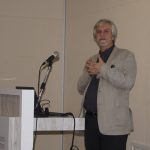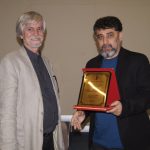
In order to provide forum for scholars and keynote lecturers to address scientific issues, to present their scientific studies and promote the scientific studies for new discoveries, Near East University organized Conference Series on ‘100 Reasons to Produce Science’. Scheduled to host Top100 Turkish Scientists from all around the world, the Conference Series has hosted four worldwide renowned Turkish scientists so far.
Being devoted to providing institutional contribution to innovative scientific information production, Near East University continues to host world renowned Turkish scientists to provide opportunity for the university students to participate in the conferences and enhance their information through academic studies that received success awards. Within the scope of the Conference Series, Near East University hosted Professor Tahir CAĞIN as the keynote speaker of the fourth forum themed on nanotechnologies. Professor Tahir CAĞIN is one of the forerunners of the scientific studies on nanotechnologies, who has been awarded with Feynman Prize in Nanotechnology which is one of the world's most prestigious awards.
What is Nanotechnology and its application?
Nanotechnology is the study and application of extremely small things and can be used across all the other science fields, such as chemistry, biology, physics, materials science, and engineering.
According to the press release issued by the Directorate of Press and Public Relations Office of Near East University, Professor Tahir ÇAĞIN, who is one of the forerunners of studies on nanotechnologies regarding multiscale modeling; from atoms to devices, attended the fourth forum of the Conference Series and delivered comprehensive information regarding nanotechnology and shared his experiences in the field of science and engineering. Touching upon the applications of nanotechnology, Professor CAĞIN stated that nanotechnology had a wide range of interest. "Today, nanotechnology is used in many fields including physics, chemistry, biology, computer science, material science, and electronics. Besides, nanotechnology has begun to provide possibilities for striking developments in the field of medicine. Based on the field of interest, nanotechnology can be classified as Nano-medicine, Nano-biotechnology, Green nanotechnology, Energy applications of nanotechnology, Industrial applications of nanotechnology, Potential applications of carbon nanotubes, and Nano-art".

One more tree has been planted in the “Forest of Scientists"....
At the end of his presentation, Professor ÇAĞIN answered the respective questions directed to him. Expressing his pride of being invited to such an outstanding conference, Professor ÇAĞIN extended his appreciations to NEU Rectorate, faculty members and students for their intense interest in the conference. Attending the conference on behalf of Near East University, the Vice Rector Prof. Dr. Mustafa KURT extended his appreciations to Professor ÇAĞIN and presented him a plaque of thanks in recognition of his unique contributions to the conference. Highlighting NEU's commitment to ensure all possibilities for scientific studies, Vice Rector Professor KURT expressed that another tree had been planted in Near East University Science Forest in name of Professor Tahir ÇAĞIN.
Who is Prof. Dr. Tahir ÇAĞIN?
Professor Dr. Tahir CAĞIN completed his undergraduate and master's degree programs in physics at Middle East Technical University. After receiving his PhD degree at Clemson University in 1988, he worked as director at Materials Simulations and Processing Center at California Institute of Technology, Pasadena, CA, and Research, Molecular Simulations Inc., Pasadena, CA. Since 2005, he is Professor of Chemical Engineering, Materials Science and Engineering, at Texas A&M University. Professor Tahir ÇAĞIN has conducted various studies in the field of application of classical and quantum-based physical chemistry to Nano-material science and engineering problems. He was awarded the Feynman Prize in 1999 for his work on Nanotechnology.
His research interests comprise computational materials science and nanotechnology with emphasis on design; characterization and development of multifunctional nano-structured materials for device and sensor applications; fundamental studies on transport phenomena (heat, mass and momentum) at nanoscale and in confined media; thermal, mechanical, electronic and magnetic properties and phase behavior of materials; materials for thermal management, power generation and energy harvesting; and development and application of multiscale simulation methods.
He has been conducting research on energy related areas over the past 20 years using state of the art computational methods ranging from quantum chemistry to molecular dynamics and methods based on phenomenological models.



